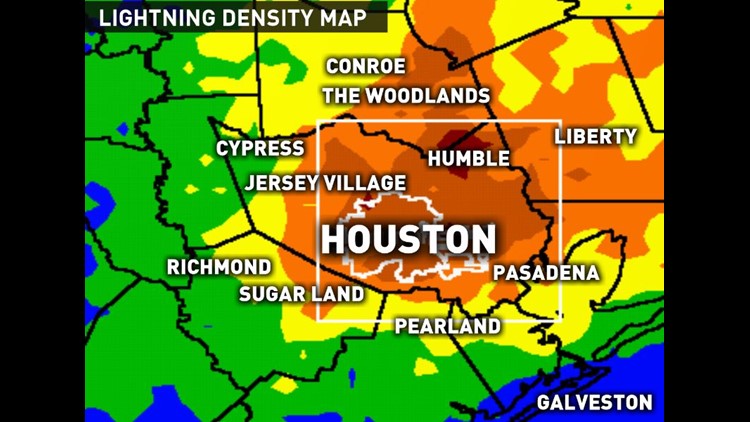HOUSTON — Three house caught fire today, struck by lightning during our lunch-hour storms. This is just the latest in a long line lightning-related fires. So what's the deal?
We're the lightning capital of Texas!
Shocking, right?
We have the most strikes per kilometer than any other part of the state. Specifically, the Houston-area towns of Humble and Jersey Village take the prize with over 4 (four) strikes per square KM per year. Who says our city doesn't have an energy about it? (Take that, Dallas.) Houston's Chamber tag-line should be, "Simply Electrifying."
So what elements are charged to cause this honor? Researchers at Texas A&M say it's a combination of Houston's heat-retaining concrete buildings, cement parking lots and our tangle of roadways, creating an 'urban heat island' effect. Simply, the city becomes much warmer than its rural surroundings. Heat feeds thunderstorms so the hotter we get, the bigger they get.
The second factor? The sea breeze and bay breeze provide miniature cold fronts each day coming into Houston from two directions, "forcing" air to rise into towering storm clouds. When that cooler air interacts with our hot city air, storms can ignite.
The third element is our network of oil refineries. Each day they provide a significant and steady dose of air pollution consisting of fine, particulate matter (microscopic trash). This allows water vapor to more easily condense into 'cloud'. More tiny bits of dirt and debris in the air can lead to the development of more cloud for the storm to work with, and to ionize the storm cell.
We may be the lightning capital of Texas, but central Florida is nicknamed, "lightning ally" because they get around 50 (fifty) strikes per square kilometer per year! That's over 10 times more lightning than we see. But it's nothing compared to the lightning capital of the world: Lake Maracaibo, Venezuela, which see over 233 (two hundred, thirty three) per kilometer per year!
But since we're in Texas, you can be proud that our lightning bolts are BIGGER! (Well, not really, but for the sake of argument let's just say they are.)



